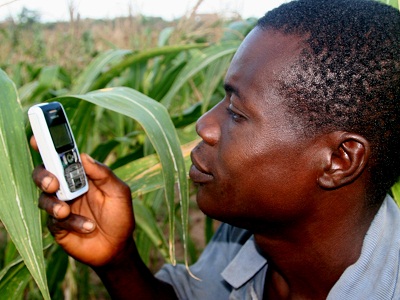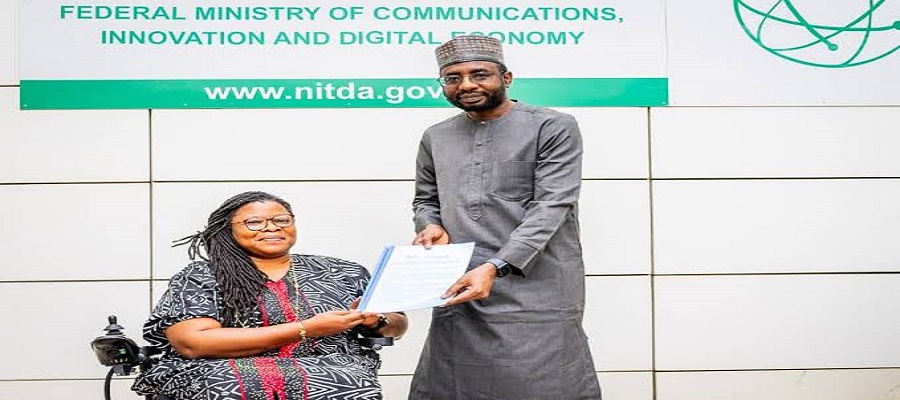General News
ICTs Set to Transform Smallholder Farming

Smallholder farming, which is the backbone of many African economies, is set to be transformed by a combination of investment and increasing access to information and communication technologies (ICTs), particularly mobile phones.
The claim was made Tuesday by Michael Hailu, director of the Technical Centre for Agricultural and Rural Cooperation (CTA) at ICT4Ag, a major conference on ICTs in agriculture.
“On this continent, 65 per cent of the workforce is employed in agriculture and the sector generates 32 per cent of GDP. Smallholder farmers, mostly women, produce 80 per cent of Africa’s food. African countries spend up to $50 billion a year on food imports. With abundant land, water and cheap labour, there is no good reason why Africa should import so much food.
“Yet there’s good reason to be optimistic. After years of neglect, governments and the private sector are increasing investments in agriculture. Nevertheless, to achieve its full potential, smallholder agriculture must be transformed from a subsistence activity to a profitable, sustainable business. ICTs play a vital role in this transformation. They provide timely advice and information. They help farmers increase productivity. They make markets more efficient. And they increase incomes along the value chain”.
The CTA Director said, “the phenomenal growth in the number of mobile phone subscribers in Africa in recent years shows that change was on the way. In 2000, there were just 16.5 million mobile subscriptions in Africa. Now, there are over 650 million. Indeed, the number of people on the continent with access to mobile phones exceeds the number with access to clean water, electricity or a bank account”.
Mr Hailu was speaking at ´ICT4Ag: The Digital Springboard for Inclusive Agriculture´ Conference, which is being organised by CTA, the Rwandan Ministry of Agriculture and Animal Resources (MINAGRI) and the Ministry of Youth and ICTs (MYICT).
The conference is taking place in Rwanda, a country where 80 per cent of the working population are employed in agriculture but where the government of President Paul Kagame has also invested heavily in agriculture and ICTs as part of its ‘Vision 2020’ agenda to turn Rwanda into a middle-income country.
Last week, the Rwandan Government announced that a new network will provide high-speed broadband access to 95 per cent of the country’s population within three years.
Rwandan ministers attending the conference shared the upbeat mood. Dr. Agnes Matilda Kalibata, Rwanda’s Minister of Agriculture and Animal Resources, reminded the audience of the significance of agriculture in poverty reduction: “Agriculture is a low hanging fruit for poverty reduction. With 40 – 65% employment in this sector in ACP Countries, any investment will have a huge impact on the economy”.
She also emphasized the importance of ICT in transforming agriculture.
“Rwanda has committed to transforming the country through ICT. Information and communication technologies (ICTs), social media, Web 2.0 and mobile applications are changing the face of agriculture and rural development in many countries. The use of mobile devices is transforming the communication landscape through dissemination and sharing, and is changing the way we do business. This conference presents an opportunity for participants, Rwandans in particular, to harness the use of ICTs in agriculture and is very much in line with the national vision of making Rwanda an ICT hub in the near future”.
Participants at the ICT4Ag conference – including agricultural experts, farmers, young innovators, ICT companies and government officials – are focussing their attention on improvements to agriculture that can be brought about by technological innovation, capacity building and creating enabling policies and infrastructure.
Key issues for discussion are the role of youth and the encouragement of entrepreneurship; the inclusion of farmers in decision-making, information and crowdsourcing; and connectivity.
The Hon Jean Philbert Nsengimana, minister of Youth and ICT of Rwanda, said: “This day is a culmination of more than 10 years of consistent investments in ICT4D policy and strategy formulation, infrastructure development, mobile penetration, education and value added services development in parallel with agriculture modernisation efforts”.
Ambassador Valentine Rugwabiza, CEO of the Rwanda Development Board, also a Cabinet member, highlighted the synergies between ICT and investment and also emphasised that indeed ICT is only a tool whose importance will be derived from how well it is used.
Michael Hailu stressed, however, that a major part of the key to securing the potential benefits of ICTs and investment in African agriculture was likely to be the extent to which countries are successful in harnessing the creative input of two key sectors: young entrepreneurs and women.
“Access to ICTs is not uniform”, he said, “and there is a digital divide. There is a significant gender imbalance, with men having better access to ICTs than women. And rural areas are significantly underserved compared to cities”.
He described the importance of young people as “pivotal”.
“Young people have the greatest aptitude for using ICTs, whether it’s to communicate or develop new apps to improve agricultural productivity or access faraway markets. Africa’s youth must therefore play a pivotal role in the transformation of smallholder agriculture.
“ICTs – in particular mobile devices – have opened up unprecedented opportunities for agricultural and rural development. This development can offer a bright future for millions of women and men who derive their livelihood from farming and other forms of rural employment. Farmers, even in the remotest locations, can easily and readily access vital information on weather, market prices, pests and diseases as well as input prices.
“It is not just about linking farmers to markets or creating employment opportunities for young people. Social media also provide a platform for rural communities to contribute to policy-making”.
More than 500 participants from 63 countries, including from Caribbean and Pacific islands, are attending the conference.
General News
NITDA Makes Case for Inclusive Tech for Special Needs

National Information Technology Development Agency (NITDA) has emphasized the importance of developing policies that intentionally include approximately 35 million persons with special needs in digital literacy and technology empowerment initiatives.

Ms. Grace Jerry, executive director, Inclusive Friends Association (IFA) and Malam Kashifu Inuwa, director-general, NITDA.
This was stated by Malam Kashifu Inuwa, director-general, NITDA, in Abuja during a meeting with a delegation from the Inclusive Friends Association (IFA), a disability advocacy organization led by Ms. Grace Jerry, its executive director.
Inuwa noted that integrating persons with special needs into these programmes supports President Bola Tinubu’s agenda of economic reform and inclusive growth.
“This has brought to my attention the need to be more intentional in the way we design our programmes because there is no way we can achieve 95 per cent digital inclusion if we exclude 35 million Nigerians.”
“The agency has always been conducting targeted training for people with special needs in various parts of the country in the past.
“We will ensure that we expand our initiatives to all parts of country and our office facility have that in consideration but our programmes going forward will reflect this inclusion,” he said.
The Director General recommended including representatives from the disability community in national ICT committees tasked with setting standards, designing training curricula, and shaping policy frameworks.
He emphasized that their participation would ensure adequate representation and facilitate implementation beyond bureaucratic constraints.
He further advocated for the integration of disability-focused initiatives into national programmes such as the National Youth Service Corps (NYSC) tech schemes, women’s training cohorts, and other major technology-driven activities. According to him, these platforms offer vital opportunities for networking, skills development, and enterprise support.
“For us, it’s beyond just training. The real goal is empowerment, how we can train people to use IT to expand their businesses and improve their lives,” Inuwa said.
He reaffirmed the agency’s commitment to strategic collaboration and invited disability-focused organisations to partner with NITDA in shaping an inclusive digital economy.
Earlier, Jerry expressed appreciation to the agency for the engagement and highlighted the digital gap within the disability community.
She said the government’s goal of achieving 95 per cent digital literacy by 2030 would only be realistic if it was truly inclusive.
“Digital literacy is fast becoming a foundational skill for employment, and without deliberate inclusion, millions will be left behind,” Jerry said.
The meeting highlighted NITDA’s growing commitment to inclusive policy development, aligned with the nation’s economic reform agenda.
General News
Interswitch, Bank of Sierra Leone Champion Financial Inclusion @ Sierra Leone Fintech Forum 2.0

As part of its sustained efforts to accelerate Sierra Leone’s digital finance transformation, Interswitch, one of Africa’s leading integrated payments and digital commerce companies, in collaboration with the Bank of Sierra Leone (BSL) has successfully hosted the second edition of the Sierra Leone Fintech Forum, bringing together key stakeholders across the financial ecosystem to chart a course toward broader access, inclusion, and growth through digital payments.

The event, which held at the New Brookfields Hotel in Freetown, convened senior representatives from both the public and private sectors, including regulators, banks, fintechs, mobile money operators, and development organisations, for a day of high-level dialogue and engagement.
Building on the success of the inaugural edition, this year’s theme, “Access, Inclusion and Growth – Deepening Digital Payments in Sierra Leone,” reflected a shared commitment to building a more inclusive and resilient financial system through collaboration and innovation.
Delivering the keynote address titled “Building on Progress: Expanding Access, Driving Inclusion, and Fueling Growth for National Prosperity,” Akeem Lawal, Managing Director, Payment Processing and Switching (Interswitch Purepay), reinforced the company’s commitment to co-creating value in the markets it serves.
“Financial inclusion goes beyond launching more apps or issuing more cards, it’s about solving real problems with solutions that are scalable, secure, and grounded in local realities. Since the first edition of the Fintech Forum, Sierra Leone has made clear progress, with strong mobile penetration and a forward-looking Central Bank. What’s needed now is execution that is sustained, coordinated, and responsive to the realities on the ground.
“By applying lessons from multiple African markets and tailoring them to local needs, Interswitch is committed to supporting Sierra Leone’s digital transformation. That means enabling agency networks that function effectively, driving merchant acceptance to reduce cash reliance, and working closely with regulators to co-create policy that drives real progress and inclusive growth.”
In his remarks, Dr. Ibrahim Stevens, Governor, Bank of Sierra Leone, commended Interswitch’s continued investment in the country’s digital transformation journey. He highlighted the Central Bank’s commitment to driving regulatory innovation and building an inclusive ecosystem. He said,
“The Bank of Sierra Leone recognises the critical role of digital financial services in building a more inclusive and resilient economy. Events like the Sierra Leone Fintech Forum, in collaboration with innovators like Interswitch, help accelerate the adoption of technologies that bring more Sierra Leoneans into the formal financial system. We remain committed to creating an enabling regulatory environment that fosters innovation while ensuring consumer protection and financial stability.”
A key highlight of the forum was the live demonstration of Interswitch’s Agency Banking solutions, designed to bridge the gap between traditional banking infrastructure and underserved and remote communities. Attendees experienced firsthand how the platform supports secure, efficient, and accessible financial transactions across Sierra Leone through a decentralised network of agents.
The event featured a series of insightful panel discussions, interactive Question & Answer sessions, and networking opportunities, fostering collaboration and knowledge exchange across the ecosystem. As mobile connectivity expands and Sierra Leone’s digital agenda accelerates, the forum provided a timely platform to align actors, surface practical solutions, and build collective momentum toward a more inclusive financial system.
The Sierra Leone Fintech Forum reaffirmed Interswitch’s role as a catalyst for digital finance transformation in the region and across the continent. As the financial landscape continues to evolve, the company remains committed to supporting the country’s financial inclusion goals through innovation, shared infrastructure, and strategic partnerships that power a more inclusive, digital and future-ready economy.
General News
AFC Proffers Action Plans for Nigeria, Africa to Unlock $4trn from Investors to Grow Economy

Nigeria and other African nations can tap up to $4 trillion in capital from institutional investors, an amount that could be used to fund the continent’s infrastructural gaps and engineer much-needed economic growth, according to the Africa Finance Corporation.

While there are as investable domestic capital across banking assets, institutional funds, and reserves, the multilateral lender revealed on Thursday that funds are still being channeled into “low-risk and short-term instruments instead of being channelled into the real economy.”
“Redirecting more savings into the real economy is critical,” said Rita Babihuga-Nsanze, AFC chief economist and director of strategy, speaking during the AFC’s 2025 State of Africa’s Infrastructure briefing. “Africa must build its intermediation infrastructure to match its development needs.”
Nigeria is however demonstrating how Africa can unlock domestic capital for infrastructure, with its pension fund investments in the sector rising from just $6 million in 2015 to more than $155 million in less than a decade.
This milestone, driven largely by reforms and credit enhancement mechanisms like InfraCredit, underscores the growing role of pensions in financing long-term development on the continent.
Data from the Africa Finance Corporation (AFC) shows that as of February 2025, Nigeria’s infrastructure-related pension assets had grown to N250.87 billion, representing 1 percent of total assets under management (AUM).
This is a sharp increase from the N1.19 billion recorded in 2015, which stood at just 0.02 percent of AUM.
A turning point came in 2017, with the launch of InfraCredit and Nigeria’s maiden corporate infrastructure bond. The credit guarantee initiative helped de-risk infrastructure projects, attracting conservative institutional investors like pension fund administrators (PFAs).
Chinua Azubike, managing director of InfraCredit said the credit-guarantee institution has helped facilitated bonds to build critical infrastructure, citing the bond raised for the construction of the Lagos Free Zone.
Azubike noted that while perception of risks persists, the company has “zero default rate” despite being involved in well over 12 sectors.
But while Nigeria’s growth is notable, pension allocations across Africa remain largely skewed toward low-risk, short-term instruments such as government securities and money market funds.
In countries like Ghana and Uganda, over 75 percent of pension assets are held in government bonds. Nigeria itself still holds 63 percent of its pension assets in these instruments.
This conservative stance, analysts say, reflects both regulatory caution and the underdevelopment of local capital markets.
In contrast, economies like India and OECD countries show a more balanced allocation, with significant exposure to corporate debt, real estate, and alternative investments. For example, OECD pension funds allocate nearly 20 percent to alternatives, according to AFC data.
To replicate Nigeria’s model, experts are calling for a coordinated effort to deepen capital markets, build risk assessment capacity, and create vehicles that can intermediate long-term finance effectively.
Beyond returns, pension investments in infrastructure have the added benefit of creating jobs, boosting productivity, and supporting economic resilience, critical needs in a post-pandemic, climate-vulnerable Africa.

 Telecom3 days ago
Telecom3 days agoTelcos Threaten to Disconnect Banks over Misinformation on New USSD Charges

 Telecom3 days ago
Telecom3 days agoMTN Nigeria Plans N900Bn in Service Upgrade

 General News3 days ago
General News3 days agoJumia Marks 13 Years of E-Commerce Innovation and Impact in Nigeria

 Telecom3 days ago
Telecom3 days agoTelecom Regulators in Africa Chart New Course for a Data-driven Future

 Broadcasting3 days ago
Broadcasting3 days agoNetflix Hikes Subscription Fees Again in Nigeria over “Market Conditions”

 News3 days ago
News3 days agoAbbas Jega, Ex-AMCON ED, Testifies, Says Arik Never Cooperated With AMCON

 Broadcasting3 days ago
Broadcasting3 days agoNBC, Nigcomsat Launch Satellite Plan to Transform Broadcasting

 E-Financial3 days ago
E-Financial3 days agoNDIC Calls for Inputs to IADI Core Principles for Effective Deposit Insurance




























